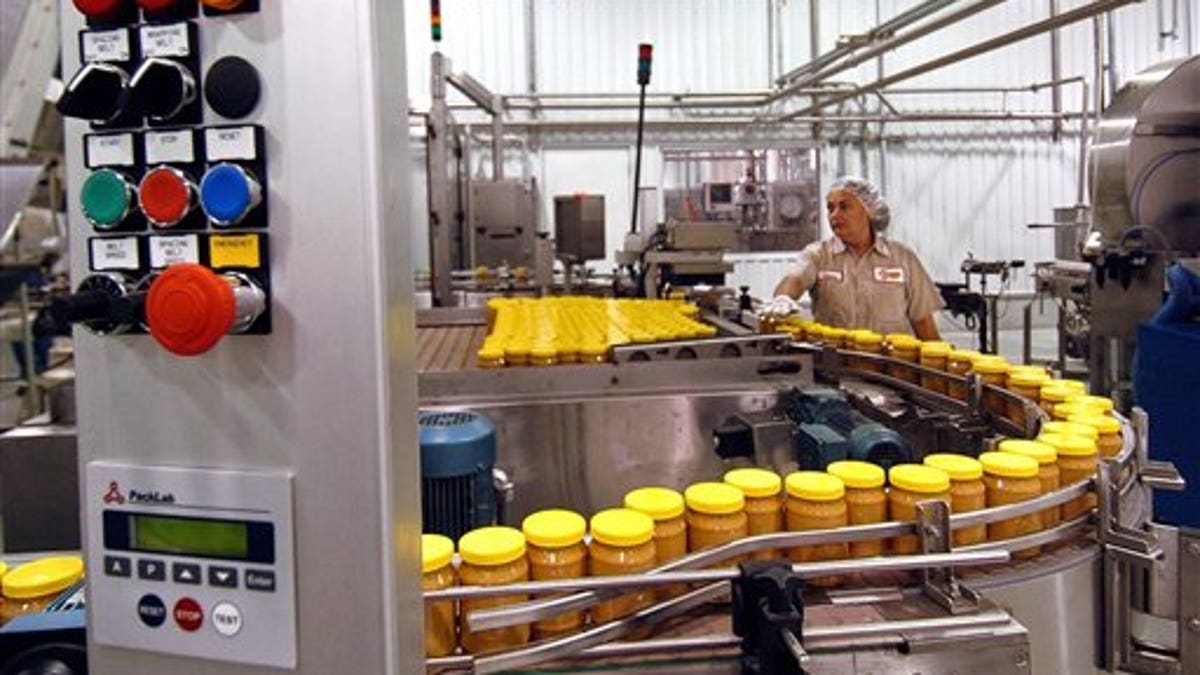
Sunland’s largest organic peanut processing plant is located in the small town of Portales, New Mexico. (AP)
The Food and Drug Administration is cracking down on a New Mexico peanut butter plant that had repeated food safety violations over several years, using new authority to halt operations at facilities that may be producing unsafe food.
The agency on Monday suspended the registration of Sunland Inc., which is the country's largest organic peanut butter processor. FDA officials found salmonella in numerous locations in Sunland's processing plant after 41 people in 20 states, most of them children, were sickened by peanut butter manufactured at the Portales, N.M., plant and sold at the Trader Joe's grocery chain. The company had announced plans to reopen its peanut processing facility on Tuesday after voluntarily shutting down earlier this fall.
The FDA gained the new authority to suspend companies' registrations in a food safety law signed by President Barack Obama in early 2011, and this is the first time the agency has used it. The ability to shut down the company's operations is a step forward in an FDA effort to stem a growing number of widespread outbreaks like the salmonella illnesses linked to the peanut butter, said Michael Taylor, the FDA's deputy commissioner for foods.
Before the food safety law was enacted, the FDA would have had to go to court to suspend a company's registration.
"We would have had to go to court and build a case," Taylor said, stressing that the burden will now be on the company to prove it is safe.
Sunland had closed its peanut processing facility after the September outbreak. It planned to reopen this week with hopes of selling peanut butter again by the end of the year. Sunland spokeswoman Katalin Coburn said the FDA's decision to suspend the registration was a surprise to the company and Sunland officials had assumed they would be allowed to resume operations.
The company now has the right to a hearing and must prove to the agency that its facilities are clean enough to reopen. Coburn said Sunland is cooperating with the FDA and company officials hope they can be operating again soon.
Besides organic peanut butter, Sunland also produces many non-organic products. The company recalled hundreds of organic and non-organic nut butters and nuts manufactured since 2010 after Trader Joe's Valencia Creamy Peanut Butter was linked to the salmonella illnesses in September.
In addition to Trader Joe's, Sunland sold hundreds of different peanut products to Target, Safeway, Whole Foods and other large grocery chains. Many of the grocery stores repackaged Sunland products and sold them under their own names.
After the outbreak linked to Sunland and to Trader Joe's, FDA inspectors found samples of salmonella in 28 different locations in the plant, in 13 nut butter samples and in one sample of raw peanuts.
The agency also found improper handling of products, unclean equipment and uncovered trailers of peanuts that were exposed to rain and birds outside the facility.
The FDA said that over the past three years, the company shipped products even though portions of their lots, or daily production runs, tested positive for salmonella in internal tests. The agency also found that the internal tests failed to find salmonella when it was present.
FDA inspectors found many of the same problems, including employees putting their bare fingers in empty jars before they were filled, open bags of ingredients, unclean equipment and many other violations, in a 2007 inspection. Similar issues were recorded by inspectors in 2009, 2010 and 2011, although government officials didn't take any action or release the results of those inspections until after the illnesses were discovered this year.
In a statement issued earlier this month, Sunland's president and chief executive officer, Jimmie Shearer, denied the company knowingly shipped tainted products.
"At no time in its 24-year history has Sunland Inc. released for distribution any products that it knew to be potentially contaminated with harmful microorganisms," Shearer said in a statement posted on the company's website. "In every instance where test results indicated the presence of a contaminant, the implicated product was destroyed and not released for distribution."
A separate peanut butter outbreak in 2009, not related to Sunland, was linked to hundreds of illnesses and nine deaths.








































